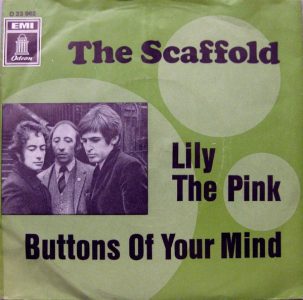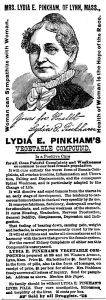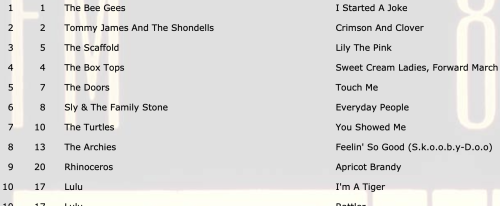#42: Lily The Pink by The Scaffold
City: Fredericton, NB
Radio Station: CFNB
Peak Month: April 1968
Peak Position in Fredericton ~ #3
Peak position in Vancouver ~ did not chart
Peak Position on Billboard Hot 100 ~ did not chart
YouTube: “Lily The Pink”
Lyrics:
The Scaffold was a comedy-music-poetry trio from Liverpool, England. It consisted of Mike McGear (born Peter Michael McCartney in Liverpool in 1944), Roger McGough (born in 1937 in the Liverpool suburb of Litherland, England), and John Gorman (born in 1936 in the Liverpool suburb of Birkenhead, England). In the early 1960s, McGough worked as a French teacher and, with Gorman organised arts events. Gorman founded The Scaffold in 1964 after working as a telecommunications engineer, about the time he met Mike McGear. The members of the Scaffold were originally part of a performing revue group known as The Liverpool One Fat Lady All Electric Show. (“One Fat Lady” is the bingo term for 8 and the performers mostly lived in the Liverpool 8 district.)
Gorman, McGear and McGough performed a mixture of comic songs, comedy sketches and the poetry of McGough. In 1966 they released several singles. This included “Goodbat Nightman”, a spoof on the popular Batman TV show. In the winter of 1967, the trio had a #4 hit with “Thank U Very Much”, an oblique song inspired from a phone call McGough made to his brother in which he sang a thank you for the gift of a camera. Later in 1968, the Scaffold released “Lily The Pink”.

“Lily The Pink” is a song about Lydia Estes Pinkham (born 1819 – died 1883). She was an American inventor and marketer of a herbal-alcoholic “women’s tonic” for menstrual and menopausal problems, which medical experts dismissed as a quack remedy, but which is still on sale today in a modified form. It was the aggressive marketing of Lydia E. Pinkham’s Vegetable Compound that raised its profile. Ads would dramatize “women’s weakness”, “hysteria”, and other themes commonly referenced at the time. Pinkham urged women to write to her personally, and she would maintain the correspondence in order to expose the customer to more persuasive claims for the remedy. Clearly the replies were not all written by Pinkham herself, as they continued after her death (written by staff of the company that sold the remedy). The original remedy consisted of pleurisy root (butterfly weed), life root (golden ragwort), fenugreek, unicorn root (known as white colic-root or white star grass), black cohosh, and alcohol. Although Pinkham’s motives were economic, many modern-day feminists admire her for distributing information on menstruation and the “facts of life”, and they consider her to be a crusader for women’s health issues in a day when women were poorly served by the medical establishment. The Compound promised to “restore women’s pep.”

Lydia E. Pinkham’s Vegetable Compound boasted “It is a positive cure…. It will cure entirely the worst form of Female Complaints, all ovarian troubles, Inflammation and Ulcerations, Falling and Displacements, and consequent Spinal Weakness, and is particularly adapted to the Change of Life…. It removes faintness, flatulency, destroys all craving for stimulants, and relieves weakness of the stomach. It will at all times and under all circumstances act in harmony with the laws that govern the female system.”
Pinkham and her “medicinal compound” for feminine disorders became the subject of a bawdy drinking song that the Scaffold released in a sanitized version. The first drinking songs associated with Lydia E. Pinkham’s Vegetable Compound emerged among Canadian soldiers during World War I. Drinking songs describing the humorous invigorating effects of some food or medicine form became widespread. The fact that Pinkham’s medicine was marketed for “female complaints” made it especially vulnerable to ribald fantasies about what it might cure. A further reason that a humble women’s tonic could become the subject of such a song – and an increasing success in the twenties and early thirties – was its availability as a 40 proof drink during the Prohibition era.
In “Lily The Pink” the medicinal compound is given to men as well as to women. Original verses from WWI inferred the compound increased female libido.
Mrs. Jones she had no children,
And she loved them very dear.
So she took three bottles of Pinkham’s
Now she has twins every year.
Lottie Smyth ne’er had a lover,
Blotchy pimples caused her plight;
But she took nine bottles of Pinkham’s–
Sweethearts swarm about her each night.
“Lily The Pink” reached #1 in Australia, Ireland and the UK, #2 in the Netherlands and South Africa, #5 in Austria, Belgium and West Germany, and #8 in Norway. In North America, the single peaked at #3 in Fredericton (NB), and #19 in Battle Creek (MI).
In 1969, the trio released a gibberish tune titled “Gin Gan Goolie”, popular with the Boy Scouts since 1905. In 1970, The Scaffold starred in their own popular weekly BBC children’s television series, Score with the Scaffold. The opening and closing theme tune was usually a shortened variation on their earlier non-charting single “2 Day’s Monday”.
In early 1971 The Scaffold provided some catchy tunes for inclusion in a television publicity campaign heralding the introduction of decimal currency to the UK. In this series of informative five-minute programmes, titled Decimal Five and shown on BBC1, their songs included such relevant lyrics as “Give more, get change” and “Use your old coppers in sixpenny lots”. During the same period The Scaffold also recorded the darkly humorous theme tune to the British horror movie Burke and Hare.
In 1972, the group made a half hour musical movie entitled Plod based on an earlier stage production that centred around Gorman’s long-running “P.C. Plod” character. McGear also released his first solo album, Woman.
This was followed by a number of singles. However, the Scaffold only had one more hit, “Liverpool Lou”, in 1974, which peaked at #7 in the UK. The band split in 1977.
In 1971, John Gorman appeared in the British comedy farce movie Up the Chastity Belt, and the comedy-drama children’s movie Melody. In 1976 and Gorman released his solo album, Go Man Gorman. He returned to the big screen in 1977 in the film Jabberwocky, and in 1979 in The Music Machine. From 1977 to 1981, Gorman was a regular in the children’s TV show Tiswas. In 1980, he was part of a band called the Bucketeers, a novelty band whose highest-charting single was “Bucket of Water Song”, which reached #26 on the UK pop chart. Into the 1980s, Gorman was on the children’s game show How Dare You!, and later on another children’s show, Razzmatazz. After a period living in France, he returned as artistic director for the Theatre on the Steps in Shropshire, England. He took part in a reunion of Tiswas regulars in 2022.
After releasing a few more singles, McGear retired from the music business in the 1980s. Having proven himself artistically, he reverted to using his family name and has since carved out a career as a professional photographer and author.
In 1978, McGough released his spoken-word solo album Summer With Monika (based upon his celebrated poetry collection of the same name). Since then he has maintained the highest-profile and most sustained post-Scaffold career. He has appeared regularly as a vocal performer on British radio and television, and continues to be a highly regarded poet and author. He is author of over thirty books of poetry and three plays.
In April 2020, the Scaffold released a re-worked version of “Thank U Very Much” to salute the frontline workers in the NHS in the UK in response to the Covid-19 pandemic.
April 19, 2025
Ray McGinnis
References:
“Emma Brockes interview: Roger McGough,” Guardian, November 14, 2005.
Arifa Akbar, “Older, wiser, angrier: Roger McGough settles some old scores,” Independent, August 18, 2012.
“Scaffold release reworked version of Thank U Very Much in aid of NHS,” Express and Star, April 9, 2020.
Dominic Cavendish, “Gunge and custard pies: what happened when ITV’s Tiswas reunited on stage, 40 years on,” April 17, 2022.
“The Real Lily The Pink,” Camera Sheffield and District, August 11, 2022.

CFNB 550-AM Fredericton (NB) Top Ten | February 8, 1969

Leave a Reply